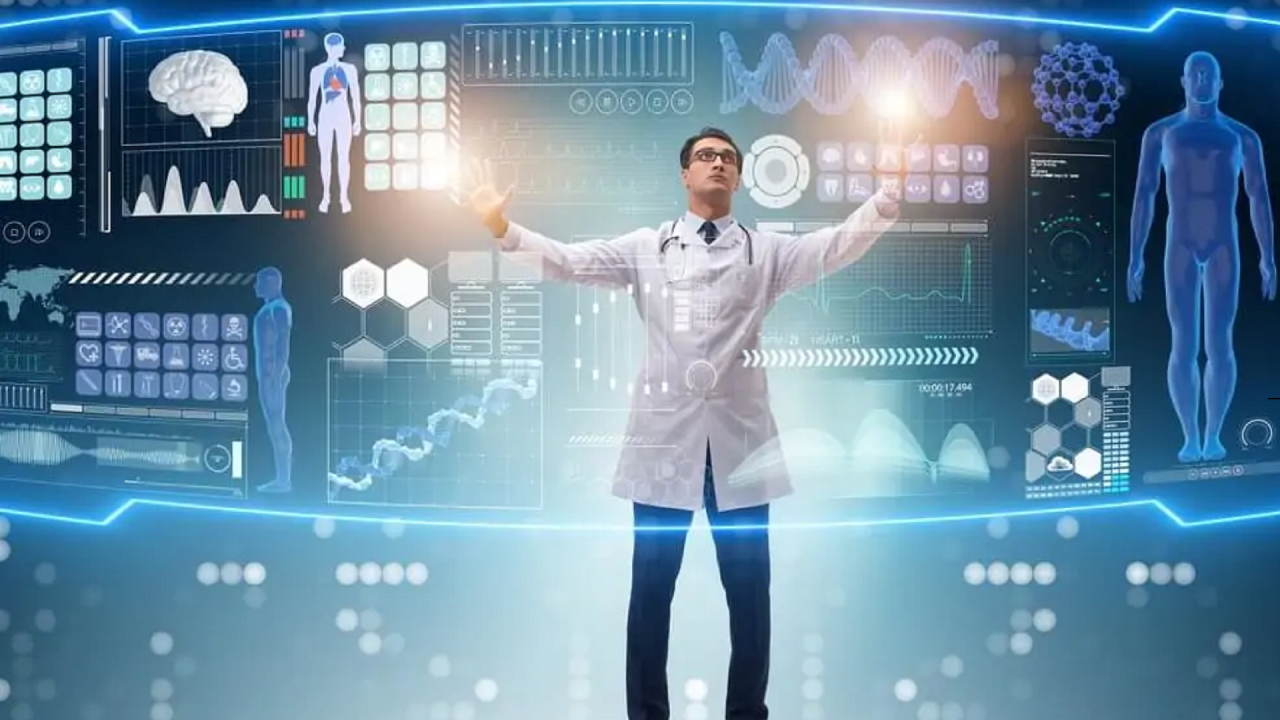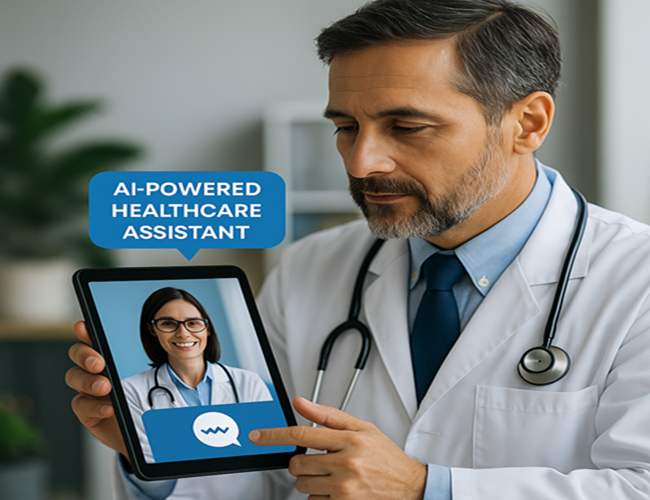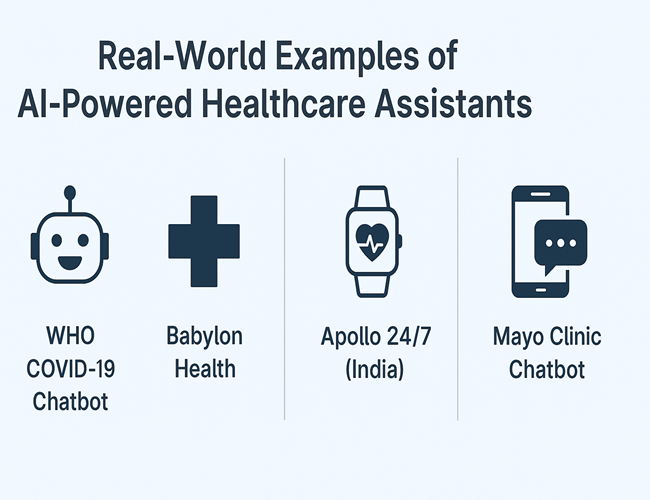
AI-Powered Healthcare Assistants: The Future of Patient Support
AI-Powered Healthcare Assistants: Transforming Patient Care in 2025
Healthcare is changing at a pace faster than ever — and technology is at the very center of this transformation. As patient loads expand, staffing gets tighter, and the demand to make a decision within seconds increases, a different kind of assistant is taking over: AI-driven healthcare assistants.

These digital assistants are not simply another tech trend. They’re transforming how hospitals, clinics and telehealth platforms treat patients, support those patients and manage essential communications.
By 2025 and beyond, AI-powered scribes, physician assistants are predicted to be an integral part of health professionals’ teams providing improvement across symptom diagnosis and chronic disease improvement.
But what are AI powered healthcare assistants, and what is driving such rapid adoption? Here we take a closer look at these smart systems that are redefining global norms for patient care.
The Role of Healthcare AI Assistants in Modern Medical Services
AI Powered healthcare assistants are intelligent machines used to automate and improve communication between patients and healthcare workers.
While they are not human staff, they use natural language processing (NLP), machine learning, and predictive analysis to provide quick, accurate, and consistent answers.
Automating patient appointment bookings, triaging patients according to symptoms, AI assistants have become essential part of hospitals operations and patients experiences.
Key Applications of AI in Healthcare Support
1. Appointment Scheduling and Management
Appointment requests, cancellations, and reschedules are managed by AI assistants without human involvement. They also schedule automatic reminders, which can drastically lower no-show rates.
2. Symptom Checking and Virtual Triage
AI healthcare assistants determine symptoms in real time from patients. They make triage decisions, prioritize critical cases and offer next steps, so doctors can amplify the signal of what are the more serious issues.
3. Medication Management
They nudge patients to take prescribed drugs, monitor adherence, and sometimes even raise the alarm to health care teams if something appears awry.
4. Chronic Disease Monitoring
For diseases such as diabetes and hypertension, AI is able to keep a patient’s health data under surveillance remotely, sending an alert if it detects an anomaly that requires immediate attention.
5. Mental Health Support
Using AI-powered virtual counsellors, which offer mental health resources, informal self-help tools and even crisis contact support, make professional care more accessible.
Real-World Examples of Healthcare AI in Action

- WHO COVID-19 Chatbot: Trained millions in symptom patterning, safety protocols, and fulfillment knowledge around the world.
- Babylon Health: Provides AI-based symptom checks and virtual GP consultations in the UK.
- Apollo 24/7 (India): Integrated teleconsultations with AI-powered health tracking and virtual triage.
- Mayo Clinic Chatbot: Walks patients through symptom checking and finding care options.
- These are just a few examples of the genuine difference AI driven healthcare assistants are creating in patient care today.
Benefits of Deploying AI in Healthcare Assistance
Implementing AI assistants brings tangible advantages:
- 24/7 Availability: Patients receive immediate answers with no waiting.
- Minimized Hospital Staffe’s Workload. They can give priority to critical care, instead of repetitive works.
- Better Patient Retain: Individualized discussions build trust and satisfaction.
- Increased Diagnosis Accuracy: Evidence-based assessments lower the likelihood of errors by the assessor.
- Extended Remote Access: AI reduces the healthcare divide in rural and underprivileged regions..
Challenges and Ethical Considerations in AI Healthcare Adoption
While AI offers tremendous benefits, challenges remain:
- Data Security: Protecting sensitive health information is crucial to maintain trust.
- Emotional Intelligence Limitations: AI lacks the empathy that human interactions provide.
- Ethical Compliance: Healthcare AI must meet strict regulations like HIPAA and GDPR.
- Addressing these hurdles is essential for sustainable, ethical growth.
Future Trends: The Next Generation of Healthcare Assistants
In the coming years, AI-powered healthcare assistants will become even more sophisticated:
- Predictive Healthcare: AI will anticipate patient needs before symptoms worsen.
- Wearable Integration: Smartwatches and fitness trackers will sync seamlessly with healthcare assistants.
- Personalized Treatment Plans: AI will recommend tailored care routines based on real-time health data.
These innovations promise a new era of proactive healthcare.
Versalence: Pioneering AI Solutions for Healthcare Support
At Versalence, we are redefining how healthcare organizations connect with their patients. Our AI chatbot solutions enable:
- Omnichannel communication across WhatsApp, websites, and apps.
- Automated ticketing and patient query management.
- Seamless integration with healthcare management systems.
- We help healthcare providers deliver fast, reliable, and compassionate support using the latest advancements in AI.
Explore Our AI Chatbot Services
Conclusion
The next-gen of AI health assistants is no more a futuristic concept. They’re here, changing the way care is delivered around the world.
By adopting these smart systems, healthcare will be able to have a more responsive care model that is more patient-centered, and has better outcomes.
Would you like to introduce a smarter AI solution into your healthcare practice? Reach out to Versalence and take the first step in the future of healthcare support.
FAQ
1. What are AI-powered healthcare assistants?
AI-powered healthcare assistants are intelligent digital tools that help automate and improve patient care processes. They can handle tasks like appointment scheduling, symptom triage, medication reminders, and basic patient support — all using artificial intelligence.
2. How do AI assistants benefit hospitals and clinics?
AI assistants help hospitals reduce workload on their staff, speed up patient support, lower operational costs, and improve patient satisfaction. They offer 24/7 availability, faster triage, and can manage repetitive administrative tasks efficiently.
3. Are AI healthcare assistants safe to use with sensitive patient data?
Yes, responsible AI healthcare platforms comply with strict regulations like HIPAA, GDPR, and local data protection laws. It’s crucial to choose solutions that prioritize data encryption, secure storage, and privacy policies.
4. Can AI healthcare assistants replace doctors or nurses?
No, AI healthcare assistants are designed to support, not replace, human medical professionals. They assist with routine tasks and early assessments but do not make complex medical decisions that require human expertise and empathy.
5. How can healthcare providers integrate AI assistants into their system?
Healthcare providers can integrate AI assistants through APIs or cloud-based platforms that connect to their existing CRM, EHR (Electronic Health Records), or patient management systems. Companies like Versalence specialize in providing customizable AI chatbot solutions tailored to healthcare needs.
6. What is the future of AI-powered healthcare assistants?
The future is promising — AI assistants are expected to work more closely with wearable health devices, offer predictive care suggestions, and provide hyper-personalized treatment support based on real-time patient data.